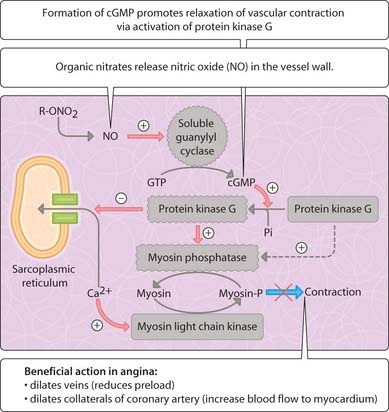11 Angina pectoris
Pathophysiology
 reducing afterload by dilating arteries (resistance vessels): calcium channel blockers, organic nitrates
reducing afterload by dilating arteries (resistance vessels): calcium channel blockers, organic nitratesTreatment of angina
Organic nitrates
Glyceryltrinitrate (GTN), nitroglycerin, isosorbide mononitrate (ISM) and isosorbide dinitrate (IDN) are prodrugs (nitrovasodilators) that are biotransformed within vascular smooth muscle cells via various enzymatic reactions (e.g. mitochondrial aldehyde dehydrogenase, cytochrome P450) to yield nitric oxide, which activates soluable guanylyl cyclase thereby stimulating vasodilatation (Fig. 3.11.1). The major action of organic nitrates is venodilatation (capacitance vessels), thereby reducing venous return and preload to the heart. This will reduce myocardial wall tension, oxygen demand, ischaemia and hence pain. Organic nitrates have little vasodilating activity on coronary arteries, particularly if atherosclerosis is present and obstruction is fixed. Vasodilatation of collateral vessels may increase blood flow to the myocardium. While not a major action, nitrates can also reduce total peripheral resistance following dilatation of arterioles (resistance vessels). However, sympathetic reflexes overcome any benefit derived from this mechanism.
< div class='tao-gold-member'>
Stay updated, free articles. Join our Telegram channel

Full access? Get Clinical Tree









